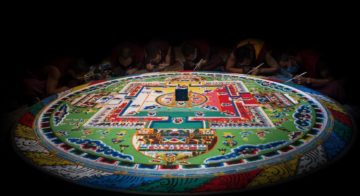by Leanne Ogasawara

1.
Ten years have passed since I left Japan. And it has been about five years since I stepped away from professional translation. I have made little effort to retain my Japanese, and so it has hardly been surprising to find my language skills falling away. There have been times where I even took a willful enjoyment realizing just how fast all those years of hard work could fade away. Like a colorful mandala made of sand that Tibetan monks labored to create and then destroy, my ability to write in Japanese disappeared overnight.
The more passive pursuits of reading and listening have proven to be less slippery. But I no longer have that feeling of being a different person in thinking and dreaming in Japanese. It’s gone. And my son, who learned Japanese as his native language, lost his skills even faster than I did. People sometimes say to me that a person can’t lose their native language, but it’s simply not true. I have met people who lost their first tongues time and time again. My son, who left Japan at seven years old, might have Japanese in their somewhere, but it is buried deep.
Effortless to learn, it’s also easy to lose languages in childhood.
In contrast, to learn a second language as an adult is a Herculean undertaking. Neither quick nor easy, it took me a decade of serious study to feel confident in Japanese.
Last week, Claire Chambers wrote a marvelous essay in these pages called Beginning Hindi with a Beginner’s Mind. By sheer coincidence, her essay mentioned a memoir that I am currently reading called Dreaming in Hindi. Written by Katherine Russell Rich, it is about the author’s year of language study in the romantic desert city of Udaipur. Read more »
